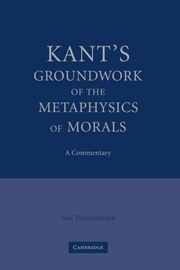Book contents
- Frontmatter
- Contents
- Acknowledgements
- Note on quotations from Kant's works
- Introduction
- Kant's Groundwork: synopsis of the argument
- Commentary
- Preface
- Section I Transition from common to philosophic moral cognition of reason
- Section II Transition from popular moral philosophy to the metaphysics of morals
- Section III Transition from the metaphysics of morals to the critique of pure practical reason
- Appendix A Schiller's scruples of conscience
- Appendix B The pervasiveness of morality
- Appendix C Universal legislation, ends and puzzle maxims
- Appendix D ‘Indirect duty’: Kantian consequentialism
- Appendix E Freedom and moral failure: Reinhold and Sidgwick
- Appendix F The project of a ‘metaphysics of morals’
- Glossary
- Bibliography
- Index
- References
Section I - Transition from common to philosophic moral cognition of reason
Published online by Cambridge University Press: 24 February 2010
- Frontmatter
- Contents
- Acknowledgements
- Note on quotations from Kant's works
- Introduction
- Kant's Groundwork: synopsis of the argument
- Commentary
- Preface
- Section I Transition from common to philosophic moral cognition of reason
- Section II Transition from popular moral philosophy to the metaphysics of morals
- Section III Transition from the metaphysics of morals to the critique of pure practical reason
- Appendix A Schiller's scruples of conscience
- Appendix B The pervasiveness of morality
- Appendix C Universal legislation, ends and puzzle maxims
- Appendix D ‘Indirect duty’: Kantian consequentialism
- Appendix E Freedom and moral failure: Reinhold and Sidgwick
- Appendix F The project of a ‘metaphysics of morals’
- Glossary
- Bibliography
- Index
- References
Summary
Kant presupposes what he takes to be the central belief about the nature of value that, at least implicitly, is universally acknowledged to be true: only a good will is good absolutely and without restriction. However, an analysis of the nature of goodness does not advance the project of grounding a new moral philosophy. Any substantive conception of value leads to what Kant later calls ‘heteronomy’: causal regularities that help us to realise a pre-given end, not to a formal law that first defines moral value. That is why he switches to analysing the cognate concept of duty. The discussion of clear cases of action ‘from duty’ – the suicidal person who nevertheless preserves his life, the beneficent act of someone not naturally sympathetic, the gout sufferer who still takes care of his long-term well-being – reveals that duty is characterised by a certain robustness in the face of opposing inclination. Actions have moral value only if they are done from duty; and duty is defined as the necessity of an action from reverence for ‘the law’.
What kind of law can this be? Kant claims to have shown that it must be purely formal, because the matter of willing – its intention or purpose – has been shown to be morally immaterial. He proceeds to give a first formulation of the supreme principle of all moral action, illustrated only briefly by means of the example of a lying promise and not yet christened with its official name, the ‘categorical imperative’.
Information
- Type
- Chapter
- Information
- Kant's Groundwork of the Metaphysics of MoralsA Commentary, pp. 15 - 49Publisher: Cambridge University PressPrint publication year: 2007
